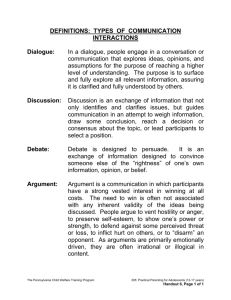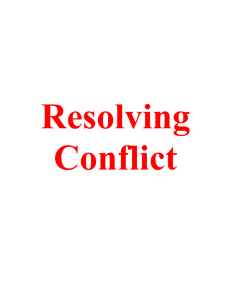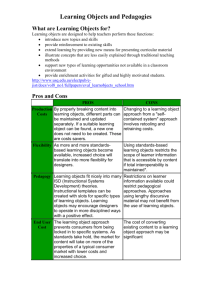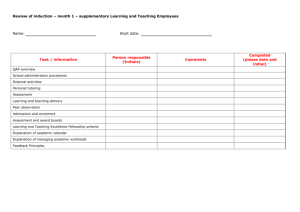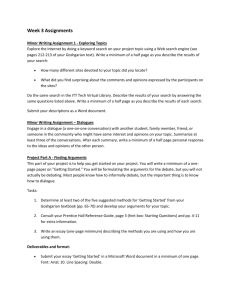File
advertisement
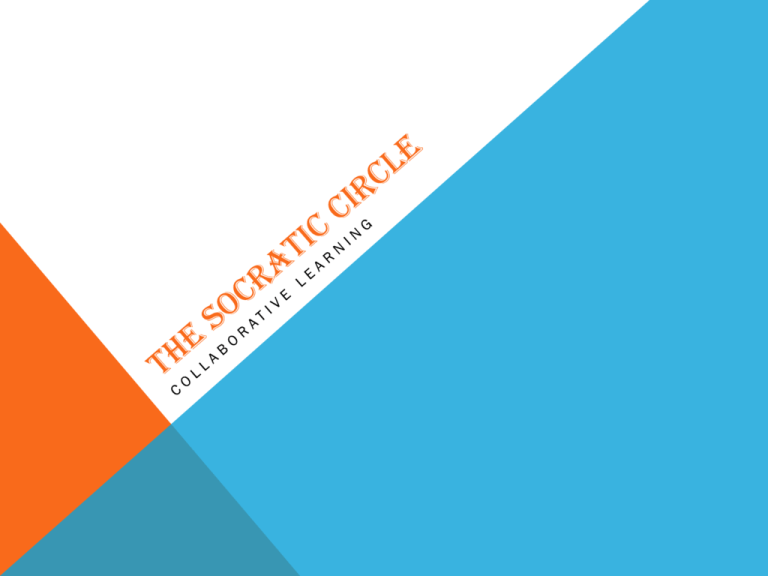
DEBATE AND DIALOGUE Dialogue is collaborative: multiple sides work toward shared understanding. Debate is oppositional: two opposing sides try to prove each other wrong. In dialogue, one listens to understand, to make meaning, and to find common ground. In debate, one listens to find flaws, to spot differences, and to counter arguments. DEBATE AND DIALOGUE (CONTINUED) Dialogue enlarges and possibly changes a participant’s point of view. Debate affirms a participant's point of view. Dialogue reveals assumptions for examination and re-evaluation. Debate defends assumptions as truth. DEBATE AND DIALOGUE (CONTINUED) Dialogue creates an open-minded attitude: an openness to being wrong and an openness to change. Debate creates a close-minded attitude, a determination to be right. In dialogue , one submits one's best thinking, expecting that other people's reflections will help improve it rather than threaten it. In debate, one submits one's best thinking and defends it against challenge to show that it is right. DEBATE AND DIALOGUE (CONTINUED) Dialogue calls for temporarily suspending one's beliefs. Debate calls for investing wholeheartedly in one's beliefs. In dialogue, one searches for strengths in all positions. In debate, one searches for weaknesses in the other position. DEBATE AND DIALOGUE (CONTINUED) Dialogue respects all the other participants and seeks not to alienate or offend. Debate rebuts contrary positions and may belittle or deprecate other participants. Dialogue assumes that many people have pieces of answers and that cooperation can lead to a greater understanding. Debate assumes a single right answer that somebody already has. DEBATE AND DIALOGUE (CONTINUED) Dialogue remains open-ended. Debate demands a conclusion. SOCRATIC CIRCLE Collective Inquiry An Exchange of Ideas There are no right answers The Goal: An enlarged, shared understanding of ideas, issues, or values through dialogue. Not simply a transmission of information WHAT ARE THE ELEMENTS OF A SOCRATIC CIRCLE? A Text - rich with ideas and values. Questions – An opening question that has no right answer which leads to new questions. Leader – Begins the circle discussion and keeps the discussion on task. Participants – Study the text, underline/highlight, listen’s actively, shares ideas, questions self and others. HABITS OF MIND What is it I think I know? How do I know what I know? How do I know that I know? What is the evidence? Whose viewpoint is this? How is it connected to other things? HABITS OF MIND How else might it be connected? What difference does it make? What If…? So what…? GROUND RULES FOR SOCRATIC CIRCLES Speak so that all can hear. Listen attentively and reflectively. Speak without raising your hands. Do not interrupt and be respectful as others are speaking. Refer to the text. Talk to each other not only the Leader/Teacher. Ask for clarification, don’t stay confused. GROUND RULES FOR SOCRATIC CIRCLES Invite and allow others to speak. Consider all viewpoints and ideas. Know that you are responsible for the quality of the discussion. Address one another respectfully. Monitor your “air time” Be courageous in presenting your own thoughts and reasoning, but be flexible and willing to change your mind in the face of new and compelling evidence PRE-SEMINAR QUESTION-WRITING Before you come to a Socratic Seminar class, please read the assigned text (novel section, poem, essay, article, etc.) and fill in the Socratic Seminar Prep Sheet. (If the Prep Sheet is not complete, you may not participate in the Socratic Seminar, and you will earn a zero.) LEVEL 1: CLOSE-ENDED QUESTIONS Write a question about the text that will help everyone in the class come to an agreement about events or characters in the text. This question usually has a "correct" answer. Example: Can you describe what caused Diggory and Polly to quarrel while in Charn? (Magician’s Nephew) LEVEL 2: OPEN-ENDED QUESTIONS Write an insightful question about the text that will require proof and group discussion and "construction of logic" to discover or explore the answer to the question. Example: Explain why Uncle Andrew believed he was above the law or rules set for others? (The Magician’s Nephew) LEVEL 3: WORLD CONNECTION QUESTIONS Write a question connecting the text to the real world. Example: In what ways does the account of the creation of Narnia reflect the Biblical account of creation. How are they similar? How are they different? (The Magician’s Nephew)
